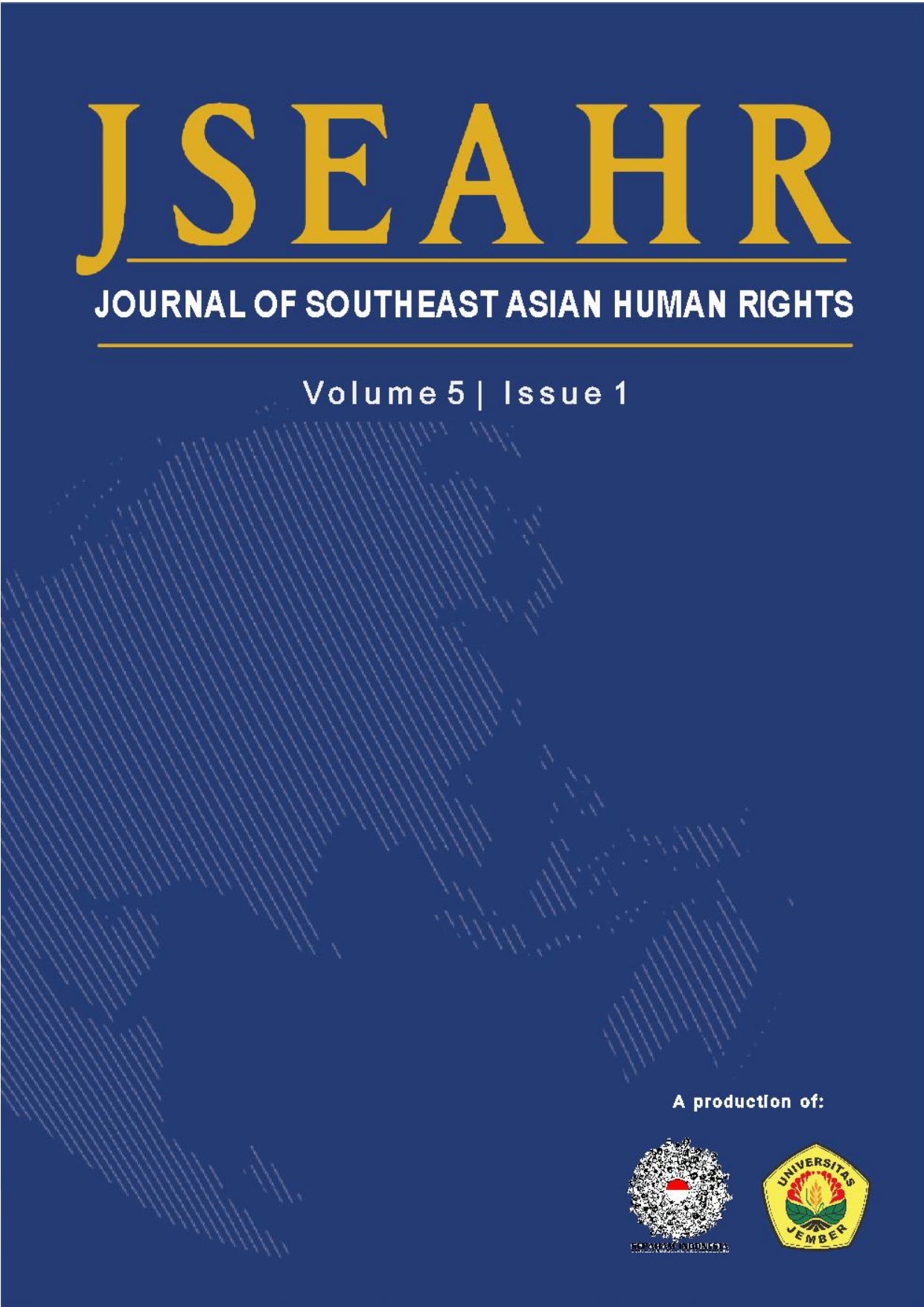Policy Development of Inclusion Village to Fulfill the Rights of Persons with Disabilities
DOI:
https://doi.org/10.19184/jseahr.v5i1.18076Keywords:
Persons with Disabilities, Village Inclusion, PolicyAbstract
Stigmatization towards persons with disabilities is so pervasive in society that it directly weakens their position in various fields unlike common other people in various fields. Although Indonesia has enacted Law No. 8 of 2016 concerning Persons with Disabilities, efforts to protect and fulfil the rights of persons with disabilities must continue to be actively encouraged. This study examines one of the strategic steps being taken to protect and fulfil the rights of persons with disabilities, the development of a Village Inclusion Policy. Aside from contributing to the fulfilment of the rights of persons with disabilities, particularly in rural areas, this policy is also expected to accelerate the improvement of welfare through increased accessibility of, and participation in, rural development. The study begins by reviewing the implementation of regulations and policies related to the protection and fulfilment of the rights of persons with disabilities in general. It then analyzes the possibility of further developing the Inclusion Village Policy, drawing on a policy review, focus group discussion, and in-depth interviews with relevant stakeholders. The results of this study illustrate the strategic value of the policy as well as the various factors that encourage or inhibit the fulfilment of the rights of persons with disabilities.
Downloads
References
Arscheidt, J, etal, “Law Making for Development -Explorations into the Theory and Practice of International Legislative Projects†(2008) Leiden University Press.
Basuki, Udoyono, “Perlindungan HAM dalam Negara Hukum Indonesia: STUDI Ratifikasi Konvensi Hak-hak Disabilitas†(2012) 10:1 Sosio-Religia.
Bitra Indonesia, “Sistem Informasi Desa SID untuk Merintis Desa Inklusiâ€, (2 February 2017).
Braithwaite, Jeanine & Daniel Mont, “Disability and poverty: A survey of World Bank Poverty Assessments and implications†(2009) 3:3 Alter (Current Trends and Development in Global Disability Research / Mondialisation et recherche sur le handicap : courants actuels) 219–232.
Colbran, Nicola, “Sense and Simplicity in Legal and Human Rights Co-Operation: A Case Study of Indonesia∙†(2015) 2:1 Asian Journal of Law and Society 195–206.
Coleridge, P, “Disabled people and ‘employment’ in the majority world: policies and realities†in A Roulstone & Colin Barnes, eds, Working futures: Disabled people, employment policy and social inclusion (Policy Press, 2005) 17.
Degener, Theresia, “Disability in a Human Rights Context†(2016) 5:3 Laws.
Disability Rights Commision, Hate crime against disabled people in Scotland: a survey report, by Disability Rights Commision (Edinburgh: Capability Scotland, 2004).
Disabled World, “Models of Disability: Types and Definitionsâ€, (6 December 2019).
Eide, Arne Henning & Mitchell Loeb, Living Conditions among People with Activity Limitations in Zambia. A National Representative Study., by Arne Henning Eide & Mitchell Loeb, Sintef rapport A262 (Oslo: SINTEF, 2006).
Emmett, T, “Disability, poverty, gender and race†in Brian Watermeyer et al, eds, Disability and Social Change: A South African agenda (The Human Sciences Research Council (HSRC), 2006) 62.
GAN, “Inclusive education to empower children with disabilitiesâ€, GAATES Global Accessibility News (13 April 2013).
Hadi, Sutrisno, Statistik 2 (Yogyakarta: Fakultas Psikologi Universitas Gajahmada, 1984).
Hosking, David L, Critical Disability Theory (Lancaster University, UK, 2008).
Houtenville, Andrew et al, eds, “Counting Working-Age People with Disabilities: What Current Data Tell Us and Options for Improvement†(2009) Upjohn Press 54.
IDA, “Indonesia Ratifies the CRPDâ€, (5 December 2011), online: International Disability Alliance.
Lamato, Ramdan, Dinamika Persebaran CRPD Sebagai Norma HAM Disabilitas di Indonesia (2019).
Larasati, Dyah et al, “Policy Brief: Inclusive Social Protection for Persons with Disability in Indonesia†(2019) TNP2K-Australian Government 8.
Mete, Cem, Economic Implications of Chronic Illness and Disability in Eastern Europe and the Former Soviet Union (World Bank Publications, 2008).
Michailakis, Dimitris, “The Systems Theory Concept of Disability: One is not born a disabled person, one is observed to be one†(2003) 18:2 Disability & Society 209–229.
Millati, Sofiana, “Social-Relational Model dalam Undang-undang Penyandang Disabilitas†(2016) 3:2 INKLUSI Journal of Disability Studies 285–304.
Mitra, Sophie, “The Capability Approach and Disability†(2006) 16:4 Journal of Disability Policy Studies 236–247.
Retief, Marno & Rantoa Letšosa, “Models of disability: A brief overview†(2018) 74:1 HTS Teologiese Studies / Theological Studies.
Rimmerman, Arie, Social Inclusion of People with Disabilities: National and International Perspectives (Cambridge University Press, 2013).
Risse, Thomas, Stephen C Ropp & Kathryn Sikkink, The Persistent Power of Human Rights: From Commitment to Compliance (Cambridge University Press, 1999).
Salim, Ishak, Out from Disability Hegemony: A Study of Political Knowledge in Indonesia Diffable Activism (Dissertation Summary, Postgraduate Program of Political Science, Universitas Gadjah Mada, 2019) [unpublished].
Soeprapto, Maria Farida Indrati, Ilmu Perundang-undangan 1: Jenis, Fungsi, dan Materi Muatan (Legislation Science) (PT Kanisius, 2007).
Stein, Michael Ashley, “A quick overview of the United Nations Convention on the Rights of Persons with Disabilities and its implications for Americans with disabilities†(2007) 31:5 Mental and Physical Disability Law Reporter 679–683.
Thomas, Philippa, Disability, Poverty and the Millennium Development Goals: Relevance, Challenges and Opportunities for DFID, by Philippa Thomas (London: Disability Knowledge and Research, 2005).
Thornicroft, Graham, Diana Rose & Aliya Kassam, “Discrimination in health care against people with mental illness†(2007) 19:2 International Review of Psychiatry (Abingdon, England) 113–122.
Tribun Jogja, “Jumlah Penyandang Disabilitas di Bantul Tertinggi di DIYâ€, (2 March 2018).
UN-CRPD Secretariat, Inclusion of persons with disabilities in society through participation in cultural life, recreation, leisure and sport, round-table discussions (New York, 2019).
UNESCO, Instrument of Inclusive City Assessment, by UNESCO (Jakarta, 2017).
United Nations General Assembly, Resolution adopted by the General Assembly on 13 December 2006, A/RES/61/106 Convention on the Rights of Persons with Disabilities (2007).







